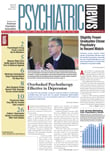Interpersonal psychotherapy (IPT) is effective in the treatment of depression both as an independent treatment and in combination with psychopharmacology.
These were key findings from a meta-analysis of 38 studies published online March 1 in AJP in Advance. The analysis included studies examining the effect of IPT as an acute treatment and as a maintenance treatment after successful recovery from a depressive disorder; studies comparing IPT with a control condition (such as waiting list, usual care, or placebo); and studies comparing IPT with another psychotherapy, with combination treatment, and with pharmacology alone.
A previous, smaller meta-analysis published online in the European Archives of Psychiatry and Clinical Neuroscience (October 4, 2007) found significant and large effects for IPT compared with placebo or no treatment, and superior effects for IPT compared with cognitive-behavioral therapy (CBT).
A substantial number of studies of IPT have been published since, and authors of the new analysis said that the earlier meta-analysis did not examine some potential confounding factors. The new, larger analysis underscores the efficacy of IPT, which the authors said is underused despite being recommended in APA guidelines and those of other organizations as a treatment for depression.
"What this report does is to consolidate previous research and to confirm the utility of IPT as an antidepressant treatment," co-author John Markowitz, M.D., told Psychiatric News. "Hopefully the paper will remind clinicians of the availability of IPT."
Markowitz is a research psychiatrist at the New York State Psychiatric Institute and a professor of clinical psychiatry at Columbia University College of Physicians and Surgeons.
The analysis found a small initial benefit for pharmacotherapy alone over IPT, while combination maintenance treatment with pharmacotherapy and IPT was more effective in preventing relapse than pharmacotherapy alone.
"The difference between pharmacotherapy and IPT alone was small," Markowitz said. "You'd need to treat 10 patients to see a difference in one.
"Basically, both treatments worked," he said. "Medication and psychotherapy presumably treat depression in different ways, so it's not surprising that there might be a synergy in combining IPT and medication. Whereas antidepressant medication relieves symptoms, it doesn't help you figure out how to handle social situations. Previous studies in the literature indicate that combined treatment never does worse than monotherapy for depression, and sometimes—particularly if there is sufficient statistical power—looks better."
IPT is a time-limited, diagnosis-targeted treatment that focuses on a specific interpersonal crisis such as complicated bereavement, a role dispute, or a role transition. Initially developed by Myrna Weissman, Ph.D., and the late Gerald Klerman, M.D., for major depression, it has since shown utility for other disorders as well. (Weissman is a professor of epidemiology and psychiatry at Columbia University, and Klerman, who died in 1992, was an expert on depression and schizophrenia and served as head of the Alcohol, Drug Abuse, and Mental Health Administration from 1977 through 1980.)
Markowitz said the therapy defines major depression as a treatable illness that is not the patient's fault. "This provides hope, helps the patient to separate symptoms from self, and particularly eases the self-blame that plagues depressed individuals."
He added that the IPT therapist helps patients focus on their feelings and recognize that those feelings are not "bad" but rather are reactions to social encounters. "Thus anger, anxiety, and sadness can become useful signposts of interpersonal encounters that patients can learn to express and to use to handle life better. This leads to better social functioning, which helps mood. And it's no wonder that IPT has been shown to build social skills, given that that's what the treatment focuses on."
Other components of the therapy include mobilization of social supports and the imposition of a time limit on the course of therapy, which encourages patients to work fast to resolve the current crisis. "Thus the treatment is organized, but not overly structured, and the patient has a clear sense of where he or she is and what is to come," Markowitz said.
The 38 studies included 4,356 patients: 1,338 in the IPT conditions, 812 in control conditions, 713 in pharmacotherapy conditions, 468 in other psychotherapy conditions, 510 in combination treatment with IPT and pharmacotherapy, and 515 in maintenance studies. Thirty-three of the 38 studies examined the effects of IPT as an acute treatment, and the remaining five examined IPT as a maintenance treatment after successful recovery from a depressive disorder.
Markowitz said that for most of the period since Klerman and Weissman developed IPT, it was a research treatment not widely disseminated to practicing clinicians—a fact that may account for what Markowitz and fellow authors said is an underutilization of the therapy. But he said that in the last decade it has begun to spread, and he cited as evidence the establishment of the International Society for Interpersonal Psychotherapy, which will be holding its fourth annual meeting this year in June in Amsterdam.
